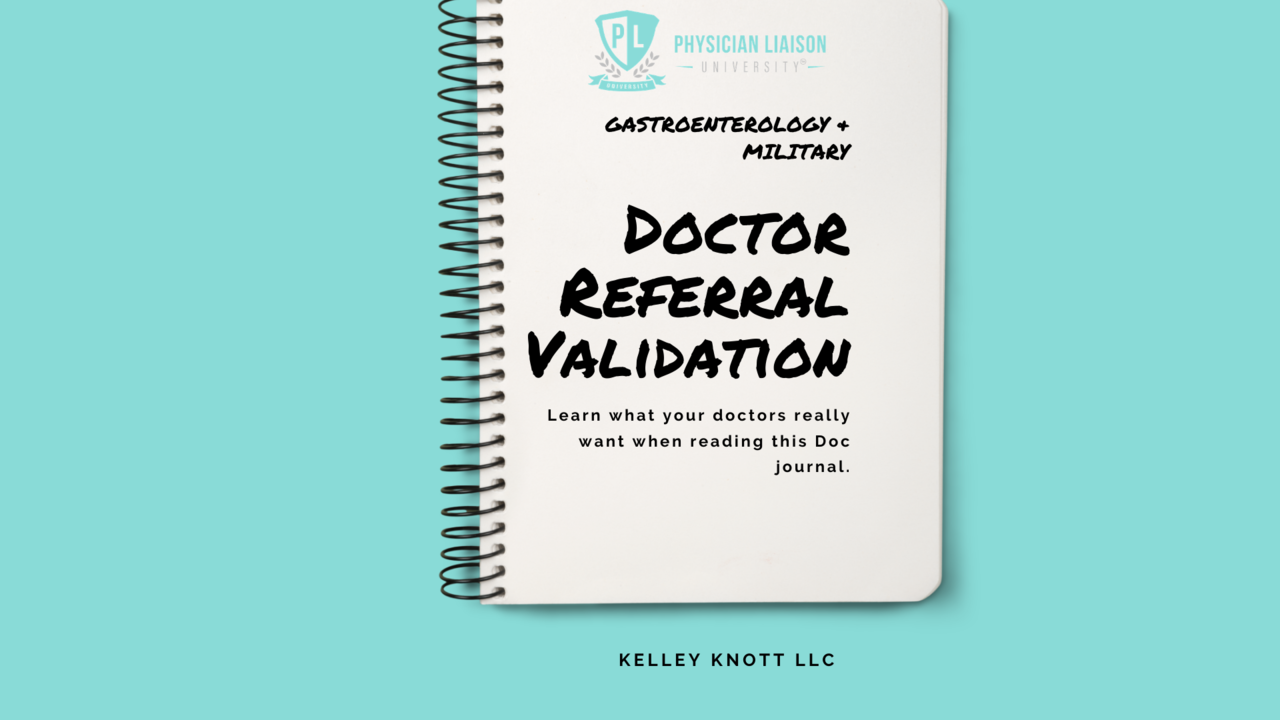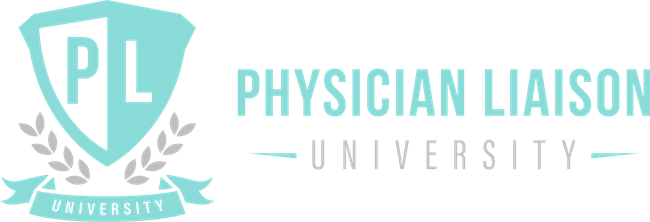Gastroenterology

We conducted validation interviews with doctors to find out their feedback and thoughts regarding Physician Liaisons. They provided insightful responses that will surely help better our services and what we can do for their practices.
Here are the questions that were asked:
1. What are the top specialties you refer out to most (ortho, OBGYN, Pain, ENT, etc), and for what (conditions/symptoms/treatment)?
2. Besides excellent patient care, when referring to a physician, what factors help you make that decision to send to that physician or practice? (examples: cell phone number, them meeting, you face to face, location, etc)
3. Is there something a physician liaison or medical rep that stands out to you in a positive or negative way, and why?
4. If a physician liaison comes to your practice to discuss building a patient-referring relationship between you and their specialists, what can they say/ do that would provide value for you or your staff?
5. What is the greatest value a physician liaison would be able to provide to your practice?
Audio Interviews:
Let's hear what Dr. Lacy's Feedback and thoughts...
Written Validation Interview:
Dr. Jimmy G.
1. Being a gastroenterologist, the specialties I refer out to most would be general surgery and interventional radiology. Sometimes, there are findings such as large polyps are diseased segments of the GI tract that is not amenable to endoscopic therapy, and once the care of the patient reaches that point, then likely, surgery is the appropriate next route. Radiology is important to us, especially interventional radiology, for placement of shunts in cirrhotic patients to help with diuretic resistance ascites or guidewire placement prior to ERCP if we encounter a difficult anatomic variant within the duodenum.
2. Whether I’ve had a favorable experience working with that physician in the past and their professionalism. The closed-loop communication between myself and said the referring physician. The location, more so to help facilitate appropriate care for my patients based on geography. Finally, whether or not my patient had a favorable experience visiting that physician’s office.
3. Strong interpersonal skills, team player, knowledgeable, and able to help facilitate and troubleshoot a request when the solution/answer is not readily available. Negative aspects include being too forward, lack of respect, and constantly not knowing enough about what’s going on.
4. To provide a solution that helps to achieve the stated goal with minimal to no interruption in the workflow of the office and minimal to no use of resources/finances.
5. Bringing in new data, research, or medical advances that would not be readily gleaned from just reading medical research journals.
Dr. Adam M.
1. As a gastroenterologist, I refer to general surgery, colorectal surgery, ENT, and infectious disease.
2. I've worked in small rural hospitals for the past 5 years; personal rapport is key
3. I've had some great liaisons, especially when there are challenging patients or more so challenging family members
4. I have only encountered liaisons in the hospital inpatient service, so not sure how to answer
5. Liaisons can certainly help in communicating with families, sometimes acting as a neutral source between doctor and patient, and allowing the patient to feel that their concerns are addressed
Dr. Ted P.
1. As a Gastroenterologist, the specialties I refer to most are Colorectal Surgery, Physical Therapy, Dietetics, Psychiatry, and sometimes back to their PCP when they present with issues that are not really GI.
2. The main thing I think about when referring a patient to another physician is my confidence that the physician will actually DO something for the problem for which I refer the patient. I consider their kindness as well, but really the results for the patient are more important to me than their personality. And as an aside, patients should want this more too, not just a ‘nice’ doctor who schmoozes everyone and does nothing.
3. I’ve never met a physician liaison, but I really like the concept of that. I’m thinking of making my own YouTube channel about the culture of medicine now and what people should know.
As far as medical reps, the main thing that I respect is when she/he remembers what we’ve already talked about ad nauseum in the past, and just gets to the point about anything new or important going forward.
4. Well, the important things would be very different for me vs. my staff. I would be interested in how the referral could be made smoothly and what the other physician can provide to my practice and patients and reciprocity. My staff would want to know details in making the referral.
5.mI think the greatest value would be to help me get information out to the public about what they should know about the medical field and what they should and shouldn’t do to maximize their health and what they can and should expect/get from their physician. Another benefit would be checking and cleaning up an online reputation, which I think is largely distorted and ridiculous, but something that can’t be ignored in this era.
Dr. Kumar K.
1. Surgery, transplant, HPB
2. Access, responsiveness, communication, easy to work with and chat
3. The more they sell, the less time I have for them. Own your specialty and knowledge. Talking shop with a surgeon or proceduralist will usually get you in trouble. Be helpful in your own way. Learn what they need. Don't seem overeager
4. They need to understand the business. There are unique issues with each specialty so you better know them before talking about generalities. What pediatrician needs is different from a surgeon. What a colorectal surgeon needs are different than a vascular surgeon
5. Practice building, increasing meaningful referrals, strategy. Even academic centers don't always get this. I do a lot of outreach on my own and it's successful, but some don't know how or where to start
Dr. Moo C.
1. I refer often to Ophthalmology and Dermatology pretty routinely. This is because I treat inflammatory bowel disease and as part of their routine surveillance, they need to be plugged in with Dermatology and Ophthalmology. Additionally, many GI conditions can have overlap with Rheumatology so I will sometimes refer to them as well.
2. Typically, referrals have been internal to my healthcare system, mostly because I have always been with large healthcare systems that encompass all specialties, and each of the centers has been the only large referral center so options were overall limited to that system. When selecting specific providers, our division has always had relationships with the respective specialties so individual reputation from working directly with that individual went a long way so I would lean on my recommendation of my colleagues if referring to a specific provider.
3. I think a quick response and just being personable have been the biggest factors for me. When looking for a practice, I definitely considered them more if the liaison/rep seemed more personable and responded in a reasonable amount of time where I didn't have to loop back to get updates after several weeks. Professionalism and attention to detail are definitely important too. I have a pretty unusual name, and about 1/2 the time, people spell my name wrong which seems like a little thing but seems like a lack of attention to detail.
4. This is a bit tough since I am in an integrated managed care system with Kaiser. Our referrals are generally internal unless there are services that are not offered, but when that happens, there are specific centers/providers that are already in place generally. I think streamlining approvals would likely be a big factor. If I am referring to someone, and that provider or health system is difficult to get approved with the coverage that most of my patients have, then I think that would influence my decision in making the referral to that provider/system. Others may have a better answer for this though since I do not really deal with it much.
5. My interaction with physician liaisons has primarily been with recruitment. When I was in fellowship and looking for jobs, the primary point of contact during the recruitment process was with the liaison, effectively becoming the face of that particular organization. In general, being professional and personable are two factors that always help with interactions.
Dr. Rafael C.
1. Refer mostly to surgery and oncology.
2. Easy communication - Cellphone.
3. No
4. I will value once COVID 19 pandemic is controlled.
5. I don’t know.
Dr. Steven N.
1. The top specialties are General surgery, cardiology, pulmonary, nephrology, urology.
2. Proximity to my practice. Familiarity with the practice. Ease of referral.
3. I really have not used medical liaisons too much, so I cannot answer this question.
4. The most important thing would be their accessibility at any time so the referral is easy for us.
5. Streamlining the referral process
Dr. Khalik A.
1. Oncology/ Re: Colon, esophageal, gastric, and pancreatic cancer treatment.
Also, General surgery: Tumors and large polyps resections.
2. Factors: easy to communicate (cell phone number, location convenience for the patient, insurance, and the ability to fit my patient in their schedule in a timely fashion.
3. My interaction is very minimal with medical liaison so I would answer as neutral.
4. Help me advertising what we can offer to the other practices in a way where it would make it very easy and convenient for the referring physicians.
5-.Basically building a large referral base.
Dr. Asma K.
1. General Surgeons (hernias, cancers), Colorectal surgeons (cancers, IBD-Crohns/Ulcerative Colitis, hemorrhoids), ENT (GERD), Dermatology (IBD) Rheumatology (IBD), Nutritionist (IBS, IBD)
2. Known colleague with contact (cell), patient references, good communication
3. Often negative when a bit forceful/pushy/ demanding, but helpful when provides samples, new medical information re drugs
4. Provide direct contact lines for them, easy scheduling for appointments, make sure records are sent/ labs/ notes are sent, etc.
5. Help for patients to get appointments (to docs we refer to), help with medical record communicationS

